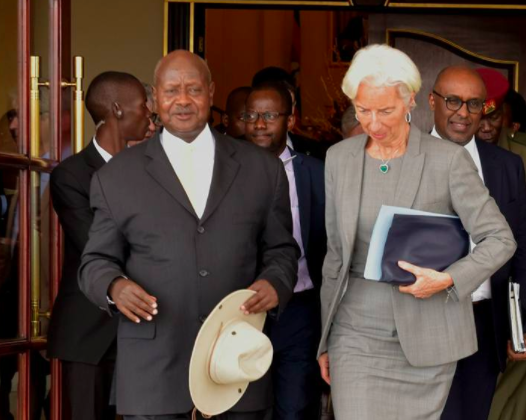The visit of the International Monetary Fund managing director, Christine Lagarde revive the topic that led Uganda to find itself in trouble last year after the World Bank said it would withhold new lending over mismanagement fears.
Uganda found itself pleading last year after the World Bank in September took a decision to withhold new lending to Uganda effective 22 Aug. 2016 after reviewing the country’s portfolio in consultation with the government.
On Friday, President Museveni Ms Lagarde, at State House Entebbe holding talks and a joint press conference talking about investment in infrastructure, helping the 68℅ Ugandans not in the money economy, enhancing social service delivery and empowering women.

But Ms Christine Lagarde warned the Ugandan government against reliance on borrowed funds is “unworkable” and could lead to a spike in debt,and advised Museveni to create “strong institutions to keep mismanagement in check”.
“Relying on borrowing alone to finance infrastructure will not cut the bill in and of itself, and it will be unworkable because debt will become too high,” she said. “Finance must come also from the mobilization of domestic revenue.”
Lagarde said although Uganda’s growth has for the last 30 years hovered at about five percent, this was not enough to create the “swift development that is so needed”.
In recent years, Uganda has ramped up external borrowing, mostly from China, to finance ambitious infrastructure development. Chinese credit is funding projects ranging from expressways and hydropower plants to airport expansion.
Plans are underway to borrow more from China for a planned standard gauge railway, as well. Uganda is also expected to borrow to build a planned crude oil pipeline and refinery.
The borrowing from China and other lenders like the African Development Bank has stoked unease among some opposition and government officials.










